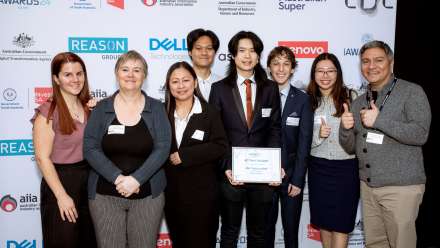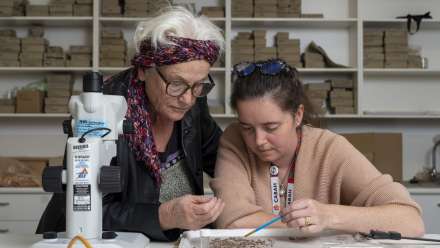One year in, 3A Institute to teach its new applied science
Unlike the first industrial revolutions, our intention is to influence and shape emerging technologies early on to reflect our humanity, culture and values. We need to manage the machines.
The ground breaking 3A Innovation Institute at The Australian National University (ANU) is well ahead of schedule creating a new applied science to manage the machines and is on track to trial the first postgraduate education package in the new applied science in 2019.
The Autonomy, Agency and Assurance Institute (3Ai) was set up on 4 September 2017 under the Directorship of world-leading technologist, Professor Genevieve Bell, to tackle complex problems emerging around artificial intelligence, big data, technology and their impact on humanity.
Professor Bell said one of the challenges of building a science from scratch is anticipating the impact on people, jobs and society from technological applications not even thought of yet.
"The collection of technologies we are currently calling artificial intelligence (AI) constitute the next industrial revolution, where rapid immersion into cyber-physical systems is having an unprecedented effect on humanity through deep economic, social and cultural shifts," she said.
"We need to manage the machines and our intention at 3Ai is to ensure that unlike with the first industrial revolutions, we influence and shape the emerging technologies early on to reflect our humanity, culture and values."
She said for Australians those values differ from other parts of the world and embody ideas like "a fair go", equality and accessibility for all.
In the first 12 months, Professor Bell has recruited a diverse team which has begun scoping the intellectual framework for the new applied science and exploring and defining the critical research questions that need to be tackled.
She said the next stage is to interrogate these research questions though a series of case studies on technologies currently being developed in several sectors.
"We'll be examining how cyber-physical systems are emerging and transforming in five very different environments, grounding our new applied science in concrete, real-life situations and complementing our academic work," she said.
"We want to produce disciplinary experts who bring together theory and praxis so people trained in this new intellectual framework will have the tools to make better decisions."
Professor Bell said research agreements with case-study partners were being finalised and are likely to be in environmental management, high-tech academia in the United States, European government policy making, the Performing Arts and the military.
"When we mapped out our timeline to create this new applied science, we imagined standing up the first educational program in 2022, but over the course of this year, we've realised the world needs the new applied science now and so we are pushing ourselves to create it in an even more accelerated timeframe."
"That's why the 3A Institute is now accepting applications for admission to courses commencing in February 2019. It will be a full-time immersive 12 months at the Master's level for what will be the first intake of students to this new applied science."
"We are designing by doing, so the first year of teaching will have an experimental element to it as we employ the rapid prototyping model of lean start-up methodology.
"This will enable us to iterate and build the curriculum in response to diverse feedback and the changing tech environment."
"We know there are a lot of people out there who'd be keen to say they obtained the first credentials in this new applied science," said Professor Bell.
"A year ago I said publicly that launching the Institute wasn't going to be easy. This year has certainly borne that out. It's genuinely challenging bringing people across disciplines and sectors together to do something new."
"But this is part of the fun, and despite - or maybe because of - the challenges, it has been a great first year," said Professor Bell.
"We've been overwhelmed by the response to what we're trying to do and we're really excited about the next 12 months and taking it through to 2022."
Watch Professor Bell's lecture, "Managing the Machines: a year in review", held on Friday 31 August 2018: https://youtu.be/NiLJxA7DNog
Information on applying for one of the limited spots in the 2019 curriculum is available online.


